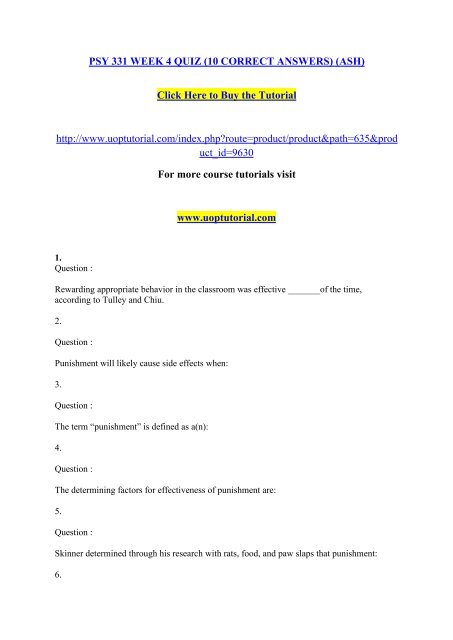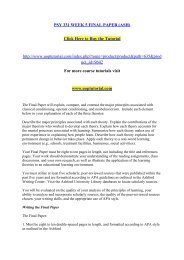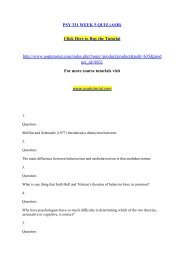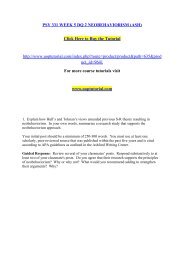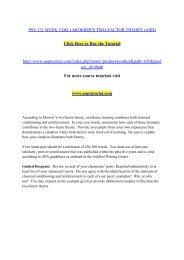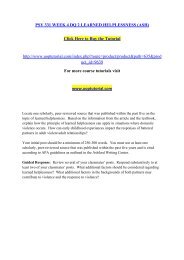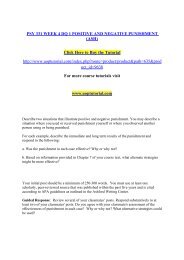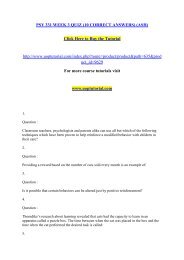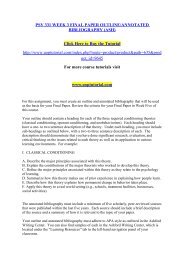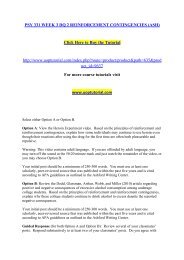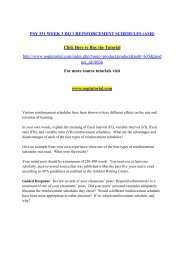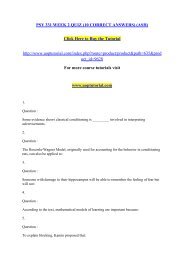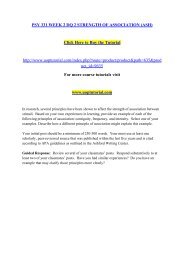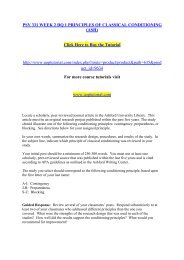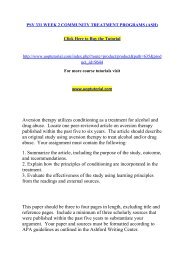PSY 331 WEEK 4 QUIZ/ Uoptutorial
For more course tutorials visit www.uoptutorial.com 1. Question : Rewarding appropriate behavior in the classroom was effective _______of the time, according to Tulley and Chiu. 2. Question : Punishment will likely cause side effects when: 3. Question : The term “punishment” is defined as a(n): 4. Question : The determining factors for effectiveness of punishment are: 5. Question : Skinner determined through his research with rats, food, and paw slaps that punishment: 6. Question : The difference between positive and negative punishment is: 7. Question : When the intensity of the punishment is increased, the response rate of rats: 8. Question : Skinner found that punishment produces: 9. Question : In the study by Solomon, Turner, and Lessac (1968), dogs punished immediately for eating their preferred food later resisted the temptation to eat for: 10. Question : In studies with varied populations, research indicated that inappropriate behaviours on a spectrum of levels decreased significantly when:
For more course tutorials visit
www.uoptutorial.com
1.
Question :
Rewarding appropriate behavior in the classroom was effective _______of the time, according to Tulley and Chiu.
2.
Question :
Punishment will likely cause side effects when:
3.
Question :
The term “punishment” is defined as a(n):
4.
Question :
The determining factors for effectiveness of punishment are:
5.
Question :
Skinner determined through his research with rats, food, and paw slaps that punishment:
6.
Question :
The difference between positive and negative punishment is:
7.
Question :
When the intensity of the punishment is increased, the response rate of rats:
8.
Question :
Skinner found that punishment produces:
9.
Question :
In the study by Solomon, Turner, and Lessac (1968), dogs punished immediately for eating their preferred food later resisted the temptation to eat for:
10.
Question :
In studies with varied populations, research indicated that inappropriate behaviours on a spectrum of levels decreased significantly when:
- No tags were found...
Create successful ePaper yourself
Turn your PDF publications into a flip-book with our unique Google optimized e-Paper software.
<strong>PSY</strong> <strong>331</strong> <strong>WEEK</strong> 4 <strong>QUIZ</strong> (10 CORRECT ANSWERS) (ASH)<br />
Click Here to Buy the Tutorial<br />
http://www.uoptutorial.com/index.php?route=product/product&path=635&prod<br />
uct_id=9630<br />
For more course tutorials visit<br />
www.uoptutorial.com<br />
1.<br />
Question :<br />
Rewarding appropriate behavior in the classroom was effective _______of the time,<br />
according to Tulley and Chiu.<br />
2.<br />
Question :<br />
Punishment will likely cause side effects when:<br />
3.<br />
Question :<br />
The term “punishment” is defined as a(n):<br />
4.<br />
Question :<br />
The determining factors for effectiveness of punishment are:<br />
5.<br />
Question :<br />
Skinner determined through his research with rats, food, and paw slaps that punishment:<br />
6.
Question :<br />
The difference between positive and negative punishment is:<br />
7.<br />
Question :<br />
When the intensity of the punishment is increased, the response rate of rats:<br />
8.<br />
Question :<br />
Skinner found that punishment produces:<br />
9.<br />
Question :<br />
In the study by Solomon, Turner, and Lessac (1968), dogs punished immediately for eating<br />
their preferred food later resisted the temptation to eat for:<br />
10.<br />
Question :<br />
In studies with varied populations, research indicated that inappropriate behaviours on a<br />
spectrum of levels decreased significantly when:


